Category: Michael Novakhov’s favorite articles
Category Added in a WPeMatico Campaign
As NATO leaders meet in Washington this week, Ukraine’s future is hanging in the balance.
Despite vows by alliance leaders to keep arming Ukraine in its fight to fend off invading Russian forces, the prospect of Donald Trump’s returning to the White House is casting a shadow over the summit.
A Trump victory in the November presidential election could mean a dramatic decline in U.S. aid to Ukraine and American political pressure on Kyiv to bow to Russian demands in any peace talks, Western officials say.
Trump has long avoided criticism of Russia’s invasion and questioned the value of the NATO alliance. His political allies have expressed skepticism about the large U.S. military aid packages provided to Ukraine.
Former national security aides to Trump have proposed a peace plan that would require major concessions from Ukraine, including forsaking the possibility of NATO membership for the foreseeable future.
Trump has offered no details about his position on Ukraine, other than to promise to bring the war to an end “before I even arrive at the Oval Office, shortly after we win the presidency.” But he has not explained how he would end the war.
On a June podcast, Trump was asked whether he would rule out Ukraine’s eventual membership in NATO. He replied that promising membership to Ukraine was a “mistake” and “really why this war started,” comments that seemed to echo Moscow’s talking points about the conflict.
In a statement, Trump campaign communications director Steven Cheung said, “President Trump has repeatedly stated that a top priority in his second term will be to quickly negotiate an end to the Russia-Ukraine war. President Trump believes European nations should be paying more of the cost of the conflict, as the U.S. has paid significantly more, which is not fair to our taxpayers. “
“The war between Russia and Ukraine never would have happened if Donald J. Trump were President. So sad.”
Republican Sen. JD Vance of Ohio, considered a possible running mate for Trump, has argued against sending tens of billions of dollars’ worth of weapons to Ukraine. In opposing the aid package Congress approved in April, Vance said that it would not be enough to shift the course of the war and that America’s defense industry could not produce enough weapons to meet Ukraine’s needs.
Trump’s campaign has said any policy proposals made by his supporters or former advisers are not endorsed by Trump.
European officials say exactly what Trump would do on Ukraine remains an open question, as his team has avoided offering any specifics about his plans. But they are worried.
The growing anxiety among European allies about a Trump victory is “completely understandable,” said John Herbst, a former ambassador to Ukraine and now a senior fellow at the Atlantic Council think tank. “Trump is something of a wild card.”
Ukrainian government officials seeking continued U.S. support have had to navigate a partisan minefield over the past year and have grown frustrated that the issue of arming Kyiv has become a pawn in America’s domestic politics.
They have viewed the Biden administration’s approach as too slow and too cautious, delaying the arrival of badly needed weapons. But they also fear what a second Trump presidency could mean for their cause, Western officials say.
For Kyiv, Trump’s plans are a mystery, said William Taylor, a career diplomat who was ambassador to Ukraine under President George W. Bush and briefly charge d’affaires in Kyiv under Trump.
“They’re not entirely sure — no one is really sure — what former President Trump would do,” said Taylor, now with the U.S. Institute for Peace think tank.
Congress adopted the military aid package in April after months of delay, with a group of pro-Trump Republican lawmakers blocking its approval. But when Congress finally voted on the proposal, Trump did not weigh in publicly. Senate Minority Leader Mitch McConnell, R-Ky., credited Trump’s public silence with helping get the aid across the finish line.
A majority of Americans continue to support arming Ukraine, according to a new survey from the Ronald Reagan Presidential Foundation and Institute, with 57% in favor, 32% opposed and 11% unsure. The poll results were nearly identical to those of a survey conducted a year ago.
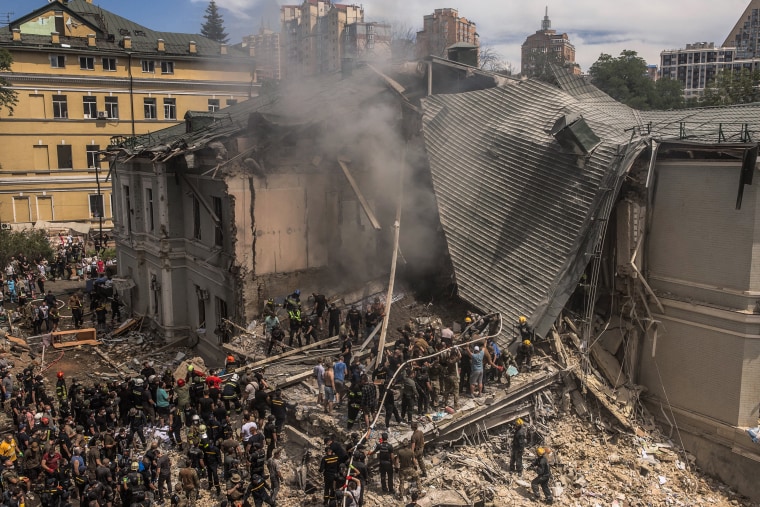
Although Ukraine has been able to blunt a major Russian offensive near Kharkiv with weapons from the U.S. and European countries, its troops are outnumbered by Russia’s large ground force, and it is struggling to maintain its air defenses against a relentless Russian bombardment of missiles and drones.
On Monday, Russia launched the heaviest aerial attack on Kyiv in four months, striking a children’s hospital in the capital and other targets across the country, killing dozens of people and injuring more than 120, officials in Ukraine said.
To help Ukraine defend itself, NATO member states are prepared to pledge this week to keep spending about $43 billion a year on military equipment for Ukraine, NATO Secretary-General Jens Stoltenberg said last week.
“I expect allies will decide at the summit to sustain this level within the next year,” Stoltenberg told reporters.
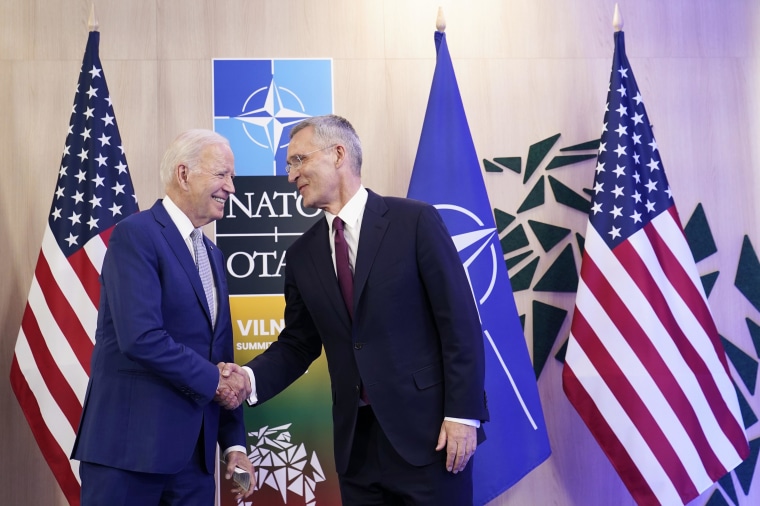
The Biden administration and other European governments are expected to make announcements at the NATO summit this week about new military hardware for Ukraine, including possibly more Patriot missile defense systems, fighter jets and other weapons.
As for Ukraine’s future security arrangements, U.S. and European officials say they hope to hammer out a statement at the summit promising an “irreversible” path to NATO membership for Kyiv.
But that language may not be enough to secure Ukraine’s place in the NATO alliance if Trump is elected, said Tamar Jacoby, the Kyiv-based director of the New Ukraine Project at the Progressive Policy Institute think tank.
“If you want to be in the West, you have to be tied to the West, and indeed, you have to be ultimately protected by the West. And so, in a way, NATO membership is the most important thing that Ukrainians are fighting for,” Jacoby said.
NATO countries should adopt a binding measure that would guarantee Ukraine’s eventual membership in the alliance, to protect Ukraine after any possible armistice negotiated between Kyiv and Moscow, she said.
“If ever there was a time to Trump-proof a path into NATO for Ukraine, this would be the moment,” Jacoby said.
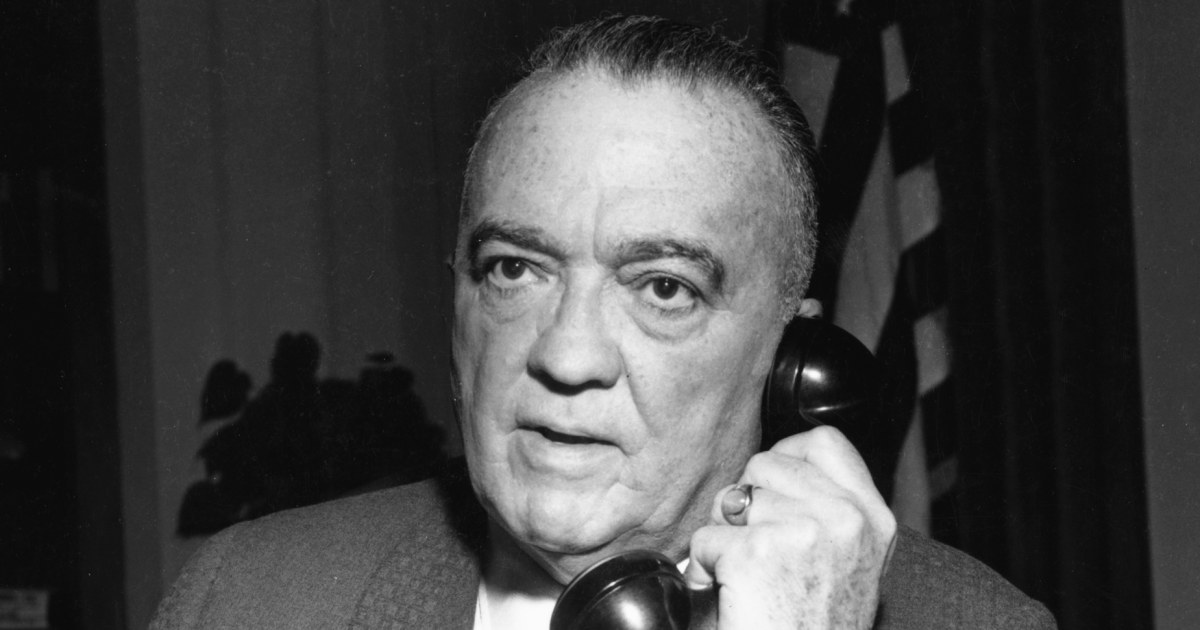
There’s been much talk about the gravity and impact of this month’s Supreme Court finding granting a former U.S. president presumptive immunity for “official” acts, and absolute immunity when exercising “core constitutional powers.” In the oral arguments preceding this decision, and in the dissenting opinion of Justice Sonia Sotomayor, the justices raised the scenario of a president getting away with ordering Navy SEALS to kill a political opponent, using the military to stage a coup or accepting a bribe in exchange for a pardon. Chief Justice John Roberts called his colleagues’ remonstrations “extreme hypotheticals” and” fearmongering.”
Chief Justice John Roberts called his colleagues’ remonstrations “extreme hypotheticals” and” fearmongering.”
There was nothing extreme in Sotomayor’s concerns, and her fears were justified. As a national security analyst, with 25 years as an FBI agent, I know we don’t need to engage in hypotheticals to lay out this ruling’s likely consequences. All we need to understand what a criminally immune Trump might do, with even one executive branch agency given carte blanche, is to remind ourselves what the nation learned about the FBI during the 1970s.
The great unraveling started in 1971, when a group of peace activists broke into a small FBI office in Media, Pa., and stole whatever files they could carry out. They suspected that the FBI was spying on anti-Vietnam war protestors, especially on college campuses. The files confirmed their suspicions, but unsure of what exactly they were looking at, they handed some of the files to reporters. One journalist, then-NBC reporter Carl Stern, was intrigued by a code word in the files: “COINTELPRO.” It would take years of dogged reporting, lawsuits to uncover documents and a number of congressional committee inquiries to fully learn the details of FBI Director J. Edgar Hoover’s secret counterintelligence program to covertly address anything and anyone deemed to be a threat by Hoover or the presidents he served under.
For over a year, a special Senate committee chaired by Idaho Democrat Frank Church conducted 800 interviews, demanded documents and held public and closed-door hearings. What they learned shocked the nation. The Church Committee and other investigations confirmed that the FBI, the CIA and the NSA had been unlawfully spying on American citizens.
The FBI, with the approval of Attorney General Robert F. Kennedy, and later with the encouragement of President Lyndon Johnson, illegally wiretapped Martin Luther King Jr. and other civil rights leaders. The FBI sent a letter to King, using details uncovered in the wiretap, essentially blackmailing King and suggesting he kill himself. There were countless other “black bag jobs” where the FBI, without court authorization, broke into people’s homes, took evidence, opened and read mail, and planted microphones — all outside the law, because someone in power deemed those American citizens to pose some kind of threat.
Hoover claimed the Black Panther Party was “the greatest threat to internal security of the United States.” (It wasn’t.)
In 1968 and into the 1970s, Hoover claimed the Black Panther Party was “the greatest threat to internal security of the United States.” (It wasn’t.) Hoover discussed the Black Panthers with then-President Richard Nixon and got the green light to go after them, when, as Nixon directed, “you sort of had the scent of the smell of a national conspiracy thing. You know, the kind of thing like the Panthers, and all that … ” The FBI developed an informant to penetrate the Panthers’ Illinois chapter. In the evening of Dec. 3, 1969, the informant drugged Fred Hampton, one of the chapter’s rising leaders. Chicago police officers, coordinating with the bureau, raided Hampton’s apartment and fatally shot him as he slept.
Unsurprisingly, these sorts of actions did not stop at the Panthers. Nixon ordered the FBI to unlawfully wiretap members of the media without benefit of lawful court orders, simply because Nixon didn’t like those reporters. And, during the Watergate scandal, he ordered the CIA to tell the FBI to end their investigation into the illegal break-in directed by Nixon’s campaign.
Remember, it was Nixon who infamously said during an interview, “When the president does it, that means it is not illegal.” Nixon’s assertion was wrong back in the 1970s. Yet, with this month’s court ruling on absolute immunity, an American president can make that declaration with a straight face. If a president is acting within his Constitutional powers, they can tell the FBI to do almost anything to suppress any “threat” — real or imagined, political or not.
According to a Reuters report, Trump’s allies are already planning to give their candidate direct control of DOJ and the FBI so that they will no longer function independent of the White House. “Two prominent Trump allies told Reuters they support eliminating the FBI’s general counsel” — the office that flashes a red light whenever the bureau is about to do something unlawful. If that red light is removed, there’d be nothing standing between a president and a crime spree.
Do Sotomayor’s hypotheticals seem “extreme” now? They shouldn’t, because we’ve already “been there, done that” as a nation.
The Church Committee’s findings resulted in numerous regulations and policies that established guardrails to prevent the FBI and other intelligence agencies from unlawfully spying on Americans. The committee also established the Foreign Intelligence Surveillance Act (FISA) court to ensure that federal judges approve all national security wiretaps and covert search warrants. Today, a president could tell the FBI to ignore the formalities of the FISA court and simply spy on his enemies — without fear of criminal liability.
Do Sotomayor’s hypotheticals seem “extreme” now? They shouldn’t, because we’ve already “been there, done that” as a nation. If none of this troubles you, you’re not paying attention. Because some day, a president you don’t support can designate you, your friends, your employer or your favorite organization or news platform a threat. That president could direct the FBI to spy on those entities and people, and you won’t know about it until it’s too late. It’s happened before, and it can happen again.

Biden, 81, said any candidates who doubt his ability should challenge him at the Democratic National Convention in August – an effort that stands no chance of success unless he lets the delegates he won in primaries this year consider other candidates.
“The bottom line here is that I am not going anywhere,” Biden said in a phone call he placed to MSNBC’s Morning Joe program. He repeated that message to donors on a private call later in the day, according to a source on the call.
Several senior House Democrats called for Biden to drop out in a Sunday phone call, media outlets reported. Other lawmakers said they supported his candidacy.
“President Joe Biden is the nominee and has been selected by millions of voters across this country,” Representative Steven Horsford, chair of the Congressional Black Caucus, said on social media. Black voters are a critical part of Democrats’ base of support.
In his letter to Democrats, Biden said he was aware of their concerns but said it was time to put them aside.
On MSNBC, Biden sounded a defiant note against wealthy donors who have called for him to drop out. “I don’t care what the millionaires think,” he said.
If Republicans were to capture the White House and both houses of Congress, Trump would face few constraints on his ability to push through major policy changes.
However, that poll also found that none of his possible replacements fared better in a matchup against Trump. The poll found Biden and Trump tied at 40% each.
Biden’s troubles appear to be increasing the number of races Democrats need to worry about in November.
Internal party polling shows that New Mexico and Virginia became more competitive following the debate, according to a source familiar with the findings, and the nonpartisan Center for Politics at the University of Virginia last week shifted its ratings on the states of Michigan and Minnesota to make each slightly more favorable for Republicans.
Together, those states will host a half-dozen of the most competitive House races.
Sign up here.
Reporting by Trevor Hunnicutt, Jeff Mason, Nandita Bose, Steve Holland, Doina Chiacu, Moira Warburton, Richard Cowan and Andrea Shalal; Writing by Andy Sullivan; Editing by Scott Malone and Howard Goller
Our Standards: The Thomson Reuters Trust Principles., opens new tab
A Republican lawmaker on Tuesday took the latest right-wing conspiracy theory about President Joe Biden to a fizzy new level by claiming he would be “jacked up” on soda for this week’s debate against Donald Trump.
“Trump’s team should not underestimate Joe Biden and his team’s ability to, y’know, whether they’re gonna jack him up on Mountain Dew or whatever it is,” Rep. Eric Burlison (R-Mo.) said on Fox Business. “Look, the State of the Union this year, he had a lot of energy for about an hour. Or an hour and a half.”
Rep. Eric Burlison (R-MO) speculates Biden could be jacked up on “Mountain Dew” to get through the presidential debate Thursday. pic.twitter.com/bvUo4eTx2l
— The Recount (@therecount) June 25, 2024
The Mountain Dew line may have been a reference to the Will Ferrell movie “Talladega Nights.”
However, Trump and his allies ― including multiple Fox News personalities ― have suggested Biden will take something, possibly caffeine, to get “jacked up” for the debate.
Trump has even called for a drug test before the event.
These claims come after Trump supporters have spent years attacking Biden’s cognition, while ignoring growing concerns that Trump’s own brainpower has diminished.
Burlison’s comments fell flat on X as critics took the fizz out of the attack:
It really wasn’t that long ago. I was out of Congress, and I’d go on @MariaBartiromo’s TV show regularly. We’d have normal conversations about policy. She was smart. Serious. And sane. She was the opposite of Hannity. And then Trump happened. Now it feels like a lifetime ago.👇 https://t.co/941RRPvqIt
— Joe Walsh (@WalshFreedom) June 25, 2024
So after claiming “Sleepy Joe” Biden has dementia and putting out numerous AI videos, now Fox News and the GOP claims that the Wizard of Oz is in the White House basement cooking up a special “dosage” of something–which could be Mountain Dew–to “jack him up” on Thursday.
— Victoria Brownworth (@VABVOX) June 26, 2024
loons https://t.co/GDprgljKqT
— John Harwood (@JohnJHarwood) June 25, 2024
Mt Dew is an antidote to Dementia? Wow, who knew?
— Herr Studt #EverGrateful 🇩🇪 #BoilerUp 🇺🇦 #RDP (@Hoosier47906) June 25, 2024
If drinking caffeine made someone a brilliant and skilled orator, I want my Toastmasters membership money back. Clearly the 7 years I was a member I should have just stuck to caffeine instead of practice and supportive people, right? What a goon. https://t.co/O8aXcb2SUd
— Schu (@SquirrelyShoe) June 25, 2024
If Trump was good at debating it wouldn’t matter one way or the other. They know he isn’t and continue to make excuses as to why Trump will not do well. All of this looks bad for Trump, not Biden.
— 🌸 🐾 A to the Z 🐾🌸 (@A_tothe_Z_Amber) June 25, 2024
Yup. Go to any Open Mic Night at a comedy club. You’ll find wannabe comedians lined around the block for their chance to get jacked on Mountain Dew. Only the lucky few get their can of Dew, of course. But they’re hilarious! Ask Seinfield. He’d be nowhere today without the Dew. https://t.co/k4dQKYMQTv
— Rory Flynn (@rorycflynn808) June 25, 2024
It is evident that they do not anticipate the debate to go well for Trump.
— 𝐂𝐡𝐢𝐝𝐢 (@ChidiNwatu) June 25, 2024
I wonder if doctors have considered “jacking up” end-stage dementia patients on Mountain Dew.
Can you imagine what it would mean to those suffering and their families? A miracle drug! https://t.co/GT1ADnYSFg— Shannon Ragland (@JuryReporter) June 25, 2024
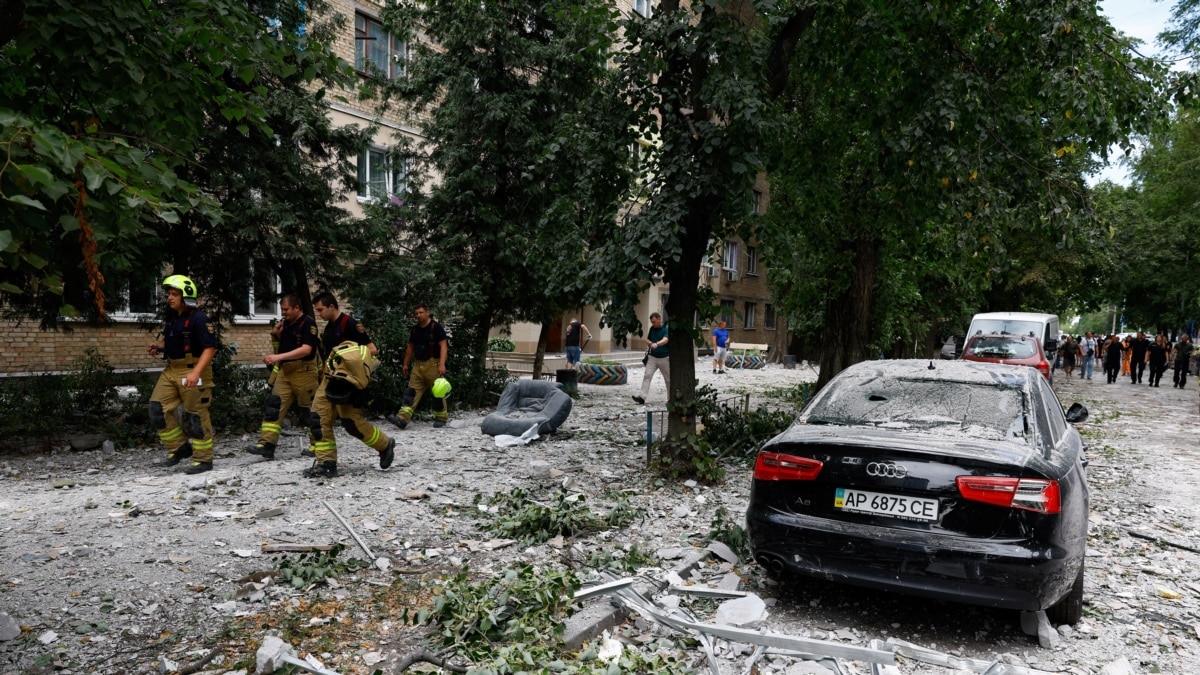
Власти украинских городов сообщили о множестве погибших и пострадавших от массированных российских ракетных атак. В Киеве разрушена детская больница
Российская ракетная атака на столицу Украины – Киев – в понедельник стала одним из самых жестоких нападений за время двухлетнего полномасштабного вторжения Москвы, заявил мэр Киева Виталий Кличко.
«Это одно из самых страшных нападений. Вы можете видеть: это детская больница», — сказал он агентству Reuters, стоя возле сильно поврежденного здания.
Позднее было уточнено, что российская ракета взорвалась в помещении Национальной детской специализированной больницы «Охматдет»
По данным властей Киева, в результате нападения в городе погибли по меньшей мере семь человек.
В результате крупного ракетного удара России по украинскому городу Кривой Рог погибли по меньшей мере 10 человек, 31 горожанин ранен, сообщили местные власти.
По их словам, в городе зафиксировано несколько попаданий, в том числе повреждение административного здания промышленного предприятия.
По меньшей мере три человека погибли в городе Покровске на востоке Украины в результате массированного российского ракетного удара, сообщил губернатор региона.
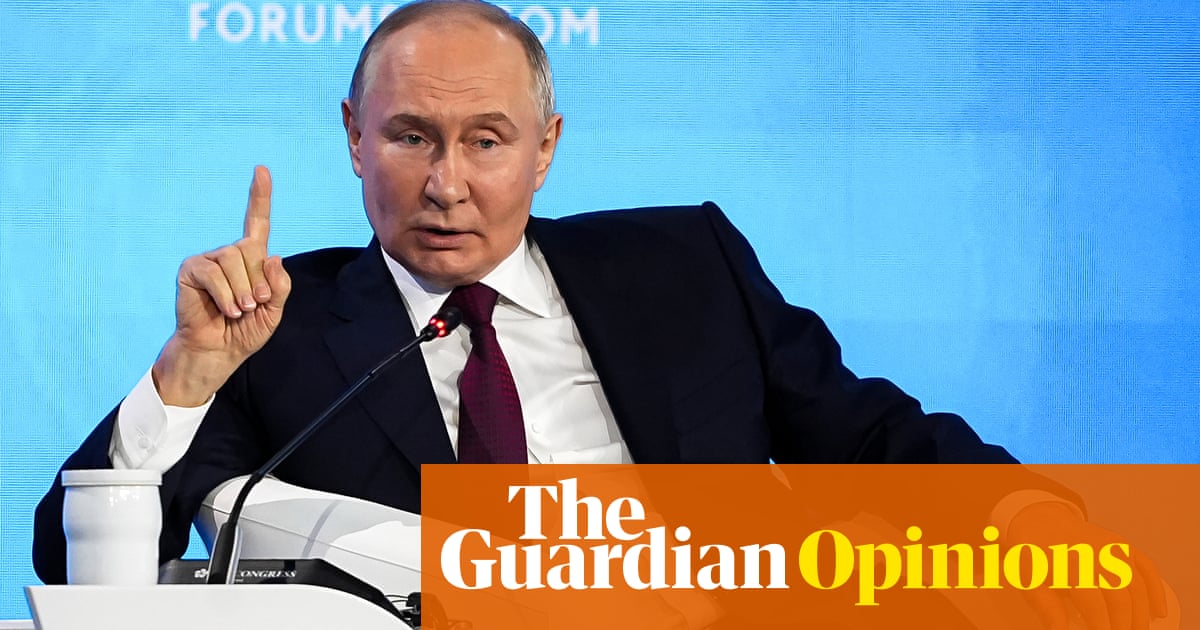
Warnings about nuclear escalation in Ukraine are now being issued with increasing frequency and urgency, due to dramatic changes in policy by some of Kyiv’s main western supporters.
Some European countries, including Britain, France and Germany, and the United States, have changed course, giving Ukraine the green light to use their weapons against sites within Russia. The latter two limited their permission to Ukrainian strikes aimed at defending Kharkiv province – although, according one report, Joe Biden may even lift that geographic restriction, as well. These steps are responses to devastating Russian strikes on Ukraine, many from points beyond its reach.
These changes in western policy – plus the French president Emmanuel Macron’s plans to send French troops to train Ukrainian forces on site and even possibly to fight – have heightened anxieties that Russia may undertake nuclear escalation in retaliation. Vladimir Putin has alluded to this possibility since the day he invaded Ukraine, as have other senior Russian officials, most notably Dmitry Medvedev, the deputy chairman of the security council of Russia, who previously served as prime minister and president, and may hold the record within Russian officialdom for the frequency of nuclear threats.
The problem leaders and pundits face is that the risks of escalation are devilishly hard to pin down. It’s impossible to make predictions about nuclear escalation in the manner of weather forecasters predicting rain or tornadoes. Simply put, there’s no reliable procedure for making assessments nor any solid evidence on which to base them because there has never been a crisis in a world with multiple nuclear powers that spiraled and culminated in the use of nuclear weapons.
Therefore, analysts and commentators trying to determine the risk of Russian escalation put themselves in Putin’s place and try to see the world, and the Ukraine war more narrowly, as they imagine he sees it. Yet they cannot be sure that their attempts to reconstruct Putin’s views – based on the state of the battlefield and the changes occurring within it, including shifts in policy by Ukraine’s western supporters – correspond to his perceptions.
Even if that problem could somehow be overcome, there’s another. Putin’s views aren’t set in stone – no leader’s are – and can shift quickly based on his reassessments of how the war is going and what he needs to do to achieve victory. Outsiders’ conclusions about escalation lack any solid evidentiary foundation beyond what Putin and his associates say on the subject. Yes, analyzing the latest iteration (2020) of Russia’s nuclear doctrine can help, but nothing prevents Russian leaders from going off script. Besides, that document sets conditions, such as a nuclear attack on Russia or a threat to its existence, that aren’t pertinent to the war in Ukraine.
Some experts attribute an increase in Russian nuclear escalation threats to posturing and intimidation attempts, others see it as alarming
There’s also no surefire way to ascertain the value of the statements emanating from Moscow’s inner circle. Are they reliable guides to the Kremlin’s true beliefs and therefore useful in predicting what Putin may actually do? Or are they part of an information war designed to unnerve the west and influence its policies governing what Ukraine may do with Nato-supplied weapons?
Because we can’t know what Putin and his foreign policy and national security crew are discussing behind closed doors, there’s no way to know whether their public pronouncements are warnings to take seriously or scare tactics to ignore. The result? Some experts attribute an increase in Russian nuclear escalation threats to posturing and intimidation attempts, others see it as alarming.
In pondering the escalation problem, it helps to imagine how and where Putin might decide to use nuclear weapons. Surely, he wouldn’t rain them down on the United States or Europe; that would be suicidal. Perhaps he’d attack Ukraine – but he’d have to find a place that’s not teeming with Russians troops, lest they be killed as well, and in large numbers. He might choose western Ukraine, far from the frontlines, but launching a nuclear strike there for demonstrative effect could still kill many people, shock the global community and even provoke Nato retaliation.
Beyond that, Putin’s messaging to the global south and sympathetic westerners about the Ukraine war has painted the west as heedless of legitimate Russian security concerns, especially Kyiv’s aspirations to membership in Nato and its growing military ties with the west. Using nuclear weapons would be a bad way to win friends and influence people.
skip past newsletter promotion
Sign up to Headlines US
Get the most important US headlines and highlights emailed direct to you every morning
Privacy Notice: Newsletters may contain info about charities, online ads, and content funded by outside parties. For more information see our Privacy Policy. We use Google reCaptcha to protect our website and the Google Privacy Policy and Terms of Service apply.
after newsletter promotion
More importantly, despite the “no limits friendship” between Beijing and Moscow, President Xi Jinping has made his opposition to the use of nuclear weapons in Ukraine clear.
While it’s prudent to worry about escalation and to avoid steps that increase the risk based on the (unachievable) certainty that Moscow’s threats are mere noise, it’s also important to understand that the risks of escalation cut both ways. Putin is not immune from them.
Ultimately, there’s no escaping the fog of war. In such circumstances it’s essential to keep in mind the downsides of being wrong – which, when nuclear weapons are involved, are catastrophic – but without succumbing to paralyzing fear. Alas, that balance, while easy to prescribe, is hard to strike.
-
Rajan Menon is the director of the grand strategy program at Defense Priorities, a professor emeritus of international relations at the City College of New York and a senior research scholar at Columbia University’s Saltzman Institute of War and Peace Studies



